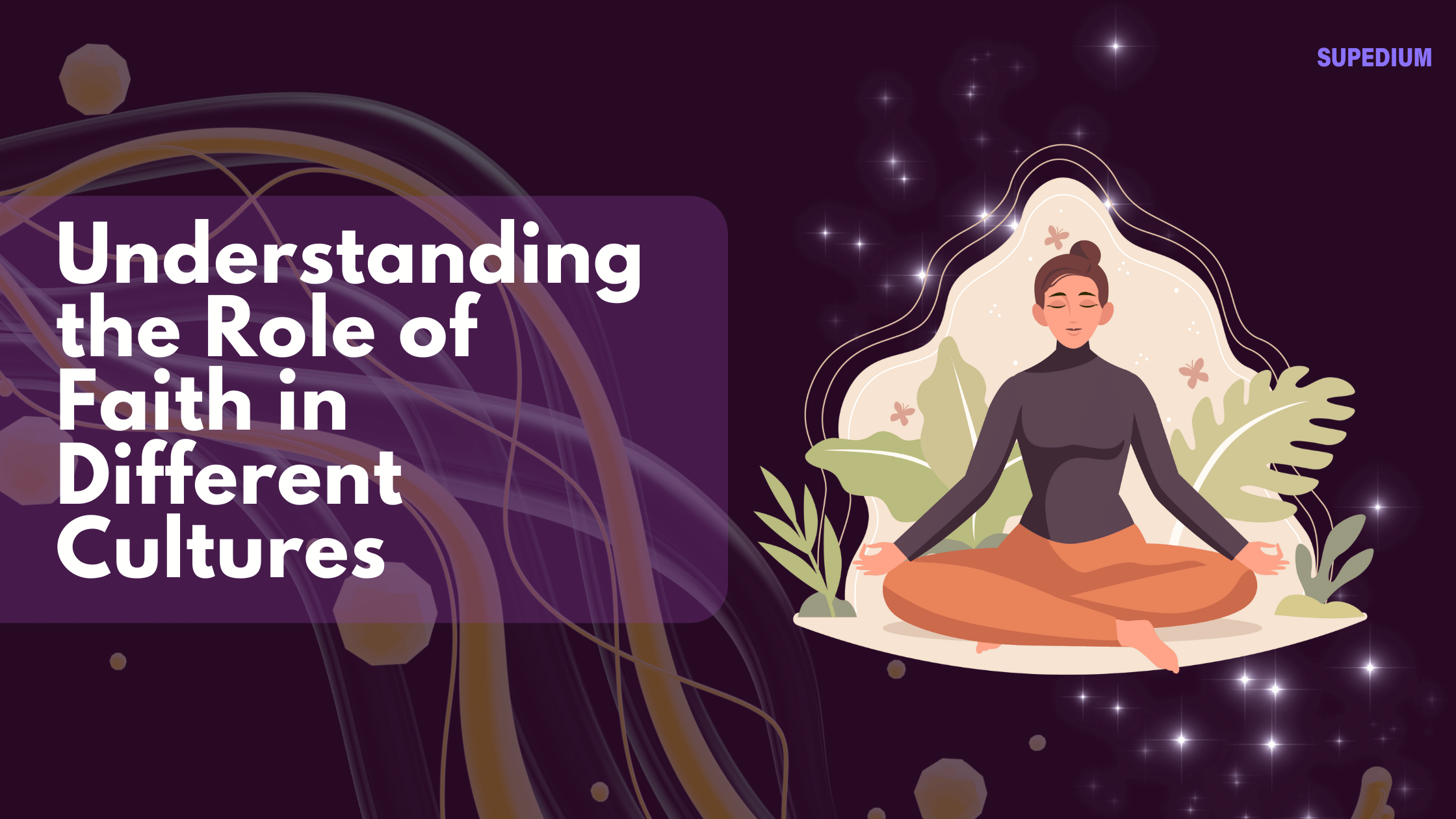Table of Contents
![]()
I. Introduction
Definition of Faith
Faith generally refers to a deep-seated belief or trust in a system of thought, often transcending empirical evidence. It encompasses religious beliefs, spiritual convictions, and personal trust. While faith and religion are closely related, they are not synonymous; faith can exist outside of organized religion and can be deeply personal and individualized.
Importance of Studying Faith in Different Cultures
Examining faith across cultures is essential for several reasons. First, faith is integral to cultural identity and provides a lens through which societies understand their place in the world. Second, faith influences societal norms, values, and behaviors, shaping everything from laws and rituals to interpersonal interactions. Finally, understanding faith in various contexts fosters global awareness and promotes coexistence among diverse groups.
II. Historical Context
Historical Development of Major World Religions
The major world religions each have rich histories that have shaped their followers’ beliefs and practices.
- Christianity originated in the 1st century CE with the teachings of Jesus Christ. Over time, it branched into various denominations, including Catholicism, Protestantism, and Orthodoxy, each contributing to the development of Western civilization in areas such as art, politics, and education.
- Islam began in the 7th century CE with the Prophet Muhammad. It quickly spread across the Middle East and North Africa, influencing various cultures and societies. Islam is divided into Sunni and Shia branches, each with distinct traditions and practices.
- Hinduism, with roots in the ancient Indus Valley Civilization, is a complex and diverse tradition that has evolved over thousands of years. It includes a variety of beliefs and practices centered around concepts such as karma, dharma, and moksha.
- Buddhism emerged in the 5th century BCE with the teachings of Siddhartha Gautama, known as the Buddha. It focuses on the path to enlightenment through practices like meditation and ethical living, with major branches including Theravada, Mahayana, and Vajrayana.
- Judaism is one of the oldest monotheistic religions, originating around 2000 BCE with the covenant between God and Abraham. It has a profound influence on Western religious and ethical thought and includes traditions such as the Torah and Talmud.
Historical Interactions Among Religions
Throughout history, religions have interacted in various ways, from conflict to syncretism. Syncretism refers to the blending of different religious traditions, which can lead to new practices and beliefs. For instance, the spread of Christianity in the Roman Empire saw the incorporation of local traditions and festivals.
Evolution of Faith Practices Over Time
Faith practices have evolved significantly due to historical, cultural, and social changes. For example, the Protestant Reformation led to changes in worship practices and church governance, while the global spread of Buddhism has resulted in various regional adaptations.
III. Faith in Western Cultures
Christianity in Europe and the Americas
In Western cultures, Christianity has played a significant role in shaping societal norms and institutions.
- Europe: Christianity has deeply influenced European history, art, politics, and education. The Protestant Reformation, led by figures such as Martin Luther, challenged the Catholic Church’s practices and led to significant religious and political changes.
- Americas: Christianity’s influence is evident in the cultural and social life of the Americas. The evangelical movements in the United States, for example, have had a considerable impact on politics and social issues.
Secularism and Faith in Modern Western Societies
In recent decades, many Western societies have seen a rise in secularism, where religious influence in public life has diminished. This trend has led to increased religious pluralism and a redefinition of the role of faith in public and private life.
Case Studies
- United States: The U.S. is marked by significant religious diversity and the prominence of evangelical Christianity, which has influenced political discourse and social policies.
- Western Europe: Countries like Sweden and France exhibit high levels of secularism, with a decline in traditional religious observance and an increase in secular values and attitudes.
IV. Faith in Eastern Cultures
Hinduism and its Variants
Hinduism, one of the oldest religions, is characterized by a variety of beliefs and practices. Major concepts include karma (the law of cause and effect), dharma (duty or righteousness), and moksha (liberation from the cycle of rebirth). Festivals such as Diwali and Holi play a crucial role in community life.
Buddhism and its Regional Variants
Buddhism, founded by Siddhartha Gautama, has different branches:
- Theravada: Emphasizes the earliest teachings of the Buddha and is prevalent in countries like Sri Lanka and Thailand.
- Mahayana: Focuses on the path of the Bodhisattva and is found in East Asia, including China and Japan.
- Vajrayana: Incorporates esoteric practices and is primarily practiced in Tibet and Nepal.
Confucianism and Taoism
Confucianism, founded by Confucius, emphasizes moral values, social harmony, and respect for authority. Taoism, attributed to Laozi, focuses on living in harmony with the Tao (the Way) and emphasizes naturalness and simplicity. Both philosophies have significantly influenced East Asian cultures.
Case Studies
- India: Hindu festivals and rituals, such as Diwali and the Kumbh Mela, reflect the vibrant spiritual life and social structures influenced by Hindu beliefs.
- China: Taoism and Confucianism continue to shape social norms and practices, even as China modernizes and adopts new values.
V. Faith in Indigenous Cultures
Diverse Belief Systems of Indigenous Peoples
Indigenous belief systems often involve animism, where natural elements are believed to possess spiritual significance. Ancestor worship and shamanism are also prevalent, with spiritual leaders acting as intermediaries between the human and spiritual worlds.
Role of Faith in Community Life and Rituals
Faith plays a central role in the community life of indigenous cultures. Ceremonies, rituals, and festivals often revolve around nature, ancestors, and spiritual practices. Shamans or spiritual leaders guide these practices, maintaining cultural heritage and communal cohesion.
Case Studies
- Native American Tribes: Rituals and ceremonies, such as the Sun Dance and vision quests, reflect deep connections to nature and spiritual beliefs.
- Australian Aboriginal Cultures: The Dreamtime mythology explains the creation of the world and the interconnectedness of all life, influencing rituals and cultural practices.
VI. Faith in Contemporary Global Context
Interfaith Dialogue and Cooperation
Interfaith dialogue aims to bridge gaps between different religious traditions, fostering mutual understanding and respect. Initiatives such as the Parliament of the World’s Religions and various local interfaith organizations work to promote peace and cooperation among diverse faith communities.
The Role of Faith in Global Issues
Faith-based organizations often address global issues such as human rights, social justice, and environmental conservation. For instance, faith leaders have been active in advocating for climate change action and addressing social inequalities.
Challenges and Controversies
Religious extremism and conflicts, such as those seen in various regions, pose significant challenges to global harmony. The balance between secularism and religious freedoms continues to be a contentious issue in many societies.
VII. Comparative Analysis
Common Themes Across Different Cultures
Across cultures, faith often addresses similar themes: the search for meaning and purpose, the performance of rituals and traditions, and the establishment of moral and ethical frameworks. These commonalities reflect the universal human quest for understanding and connection.
Unique Aspects of Faith in Various Cultures
While there are shared themes, the expression of faith is uniquely shaped by cultural contexts. Different religions and spiritual practices adapt to local customs, historical influences, and societal needs, resulting in a rich diversity of faith experiences.
VIII. Conclusion
Summary of Key Points
Faith plays a crucial role in shaping cultural identity and societal values across the world. From influencing historical developments to affecting contemporary global issues, faith is a powerful force in human societies. Understanding its various expressions and impacts helps promote greater global awareness and respect.
Reflection on the Importance of Cultural Sensitivity and Understanding
Appreciating the diversity of faith practices is vital for fostering mutual respect and harmony in a globalized world. By recognizing and valuing different perspectives, we can contribute to a more inclusive and understanding global community.
Share This





Be the first to comment